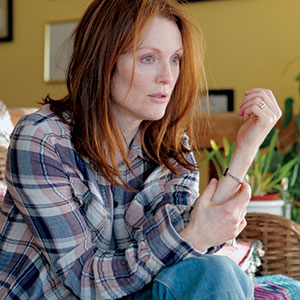

Julianne Moore seems vouchsafed for the Oscar at last after four losses. This petite, lucid actress, of great plasticity and even greater bravery, is one of the five or 10 reasons that the movies are worth attending. It’s about time she was going where she’s going—if one could only be happier about the vehicle she was travelling in.
In Still Alice Moore plays a woman swallowed up by early-onset Alzheimer’s, in what is very much the awareness-raising drama by previously risk-taking directors Richard Glatzer and Wash Westmoreland, of The Last of Robin Hood. It was made under constraint—and given the short filming time, the changes Moore goes through are remarkable. Moore acts out the gradual emptying out of a personality into grey, sad slackness.
As per the old saying that a fall off a cliff is more interesting than a fall off a cushion, the best-seller Still Alice was based upon wrenches up the tragedy. Alice has everything—she’s an NYC linguistics professor losing her vocabulary (pang!) The film places a particular emphasis on her devotion to running: is this just to show us Moore in motion? Is it to show us she’s a fighter? If Alice were as sedentary as a lot of professors are, would she sort of deserve Alzheimers’? Alice’s husband is a physician for no good reason except that women in best-selling novels are married to doctors. He’s played by Alec Baldwin, who chose a really unfortunate time and place to return to drama. If Moore tears at us by the slow process of a personality being emptied in front of us, Baldwin has to empty himself of all traces of humor. We get the devilish temptation to snicker, seeing that well-fed and cynical face reacting to the tragedy.
It’s hardly the capstone to Moore’s work. Consider just some of it: the allergic-to-everything Ms. White in Todd Haynes’ Safe—the structural critique of disease-of-the-week genre that should have killed Still Alice before it was born. One of Moore’s first important roles, in Robert Altman’s Short Cuts, is a lesson on how much impact semi-nudity can have. Whatever you think about the way Altman tended to expose his actresses, Moore, half-dressed in her segment, wasn’t prurient unless pure female contempt turns you on. She was a wife so angry she didn’t care how she was attired. She slapped down a needling husband (Matthew Modine), one of those petty men who learn nothing and forget nothing. In The Big Lebowski, Moore showed the nasty side of screwball that sensitive people always complain about, when she joins in with the jackal-like cackling of the German nihilists. One cherishes that boarding school lockjaw accent she put on the word “thorough.”
Few saw Moore in her husband Bart Freundlich’s film World Traveler and fewer liked it. But she was something to see in a small part: Moore was a deranged piece of flotsam in a small town. Her role was like an abstraction drawn from “Revenge,” the tale Alfred Hitchcock directed in episode one, season one of Alfred Hitchcock Presents—one of those trapdoor stories you only need to hear once to remember forever.
Moore has handled horror with her typical dexterity—in a fugue state observing a gourmet meal of brains in Hannibal. Her coolness in the role belies Dr. Lecter’s cheap Freudian idea that Clarice Starling is still bollixed up about her dead father. She was far more terrifying, though, as the suicidal mother in The Hours, Speaking of that part, has there ever been a heterosexual actress who has played lesbian so many times, from The Kids Are Alright to Chloe? You hear that actresses are nervous about their image, but this seems to be one of the many things that fails to intimidate Moore.
A good Moore retrospective would reveal so much more than Still Alice, which at least sends you back to the best drama about Alzheimer’s, Away from Her. If Julianne Moore gets the gold for it, so be it, but it’s like watching Jascha Heifetz take out his violin to perform “Pop Goes the Weasel.”
PG-13; 101 Min.


